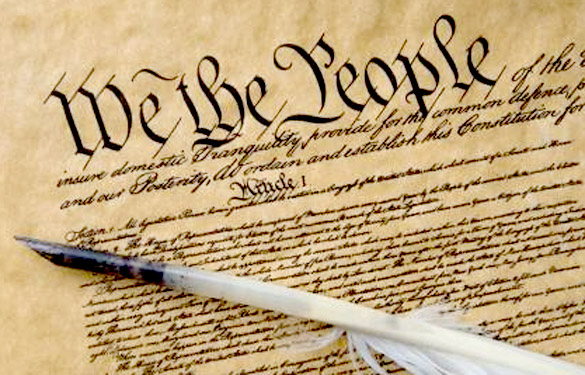Every year there are dozens of scholarly books and articles that are published describing the founding period of the United States. The debate between Federalists and Anti-Federalists over the ratification of the Constitution is one of the topics often discussed. Both the Federalists and the Anti-Federalists presented arguments that have had profound effects on subsequent American history. It is important for us to learn the full nature of their debate and how it has influenced our views on American government.

“Nothing is more certain than the indispensable necessity of government, and it is equally undeniable, that whenever and however it is instituted, the people must cede to it some of their natural rights in order to vest it with requisite powers.”1 Federalists, the supporters of the Constitution, had the support of some of the most prominent men in America, including Benjamin Franklin and George Washington. Moreover, prominent political philosophers of their time, such as Alexander Hamilton, James Madison, and John Jay, published a series of essays under a pseudonym “Publius.” These essays were widely published in newspapers throughout the nation. They explained the meaning and the virtues of the Constitution and countered the powerful arguments of the opposing side. Today, they are known as The Federalist Papers. These documents are important American contributions to modern political theory.2

Patrick Henry, a famous Anti-Federalist, was well known for his quote, “I know not what others may choose but, as for me, give me liberty or give me death!” In order to combat the attention given to those who had different opinions, the Federalists deemed their opponents as “Anti-federalists,” giving the message that individuals that were not associated with the Federalists had nothing to offer besides negative opposition and chaos. However, Anti-Federalists did have serious and intelligent arguments of their own. They presented themselves as the loyal defenders of the principles of the Revolution. Moreover, they believed that the Constitution would betray the principles of freedom by establishing a tyrannical central power in the new government.
The main claims of Anti-Federalists were that a federal government would make unfair distinction among the citizens, raise taxes, abolish the states, and end individual liberties.3 According to them “the constitution was the basic mistrust of human nature and the capacity of human beings to wield power.”4. They believed the Constitution lacked a much needed Bill of Rights, a concern that became one of the most important sources of their opposition, with at least nine out of ten Anti-Federalists wanting a written Bill of Rights.5

At the heart of the debate between Federalists and Anti-Federalists was a battle between two fears. The Federalists were afraid of disorder, anarchy, and chaos; they believed that a constitution would prevent these catastrophic events. The Anti-Federalists were not anarchists and they too recognized the need for an effective government; they believed that the greatest threat to the future of the United States was the government’s potential to become corrupt and seize more power until its tyrannical hand stretched across the country and completely dominated the citizens.6
Despite the Anti-Federalist efforts, the Constitution was ratified in 1790, but during the ratification debate, Madison conceded that a bill of rights was needed. Federalists assured that the first step of the new government would be adopting a bill of rights.
- John Jay, Federalist Papers no 2, (1787), 1. ↵
- Alan Brinkley, American History: Connecting with the Past Volume 2, 15 edition (New York: McGraw-Hill Education, 2014), 145. ↵
- Alan Brinkley, American History: Connecting with the Past Volume 2, 15 edition (New York: McGraw-Hill Education, 2014), 146. ↵
- Alan Brinkley, American History: Connecting with the Past Volume 2, 15 edition (New York: McGraw-Hill Education, 2014), 146 ↵
- Main T. Jackson, The Antifederalists: Critics of the Constitution, 1781-1788 (New York: W.W. Norton, 1974), 159. ↵
- John H. Aldric and Ruth W. Grant, “The Antifederalists, the First Congress, and the First Parties,” The Journal of Politics, vol 55 no. 2 (1993): 295. ↵



71 comments
Sabrina Drouin
Great article, I loved how clear cut you made the federalists vs. anti-federalists. It was interesting to hear both of their viewpoints on the Constitution that we all know so well. It’s funny to think about how our founding fathers argued over this so much to the point that we haven’t had to make too many foundational changes because they wanted a super stable central government. Also, I never knew that the federalists gave the anti-federalists their name to have a negative connotation, thanks for writing about this cool subject.
Tomas Salazar
Personally, I think the Federalists party had good intentions, but the antifederalists had plans. I enjoyed reading this article especially because it foreshadows and resembles the very political world that we live in today. I also enjoyed this article because of reading the Federalists Papers, now I have a greater understanding of what they were saying in them. The article was well written and made comparisons very well throughout the article, overall great read!
Samuel Vega
This is a great article about the Federalists and Anti-Federalists and their debate in shaping our nation’s government. The article gives a summary of both sides of the argument; a large centralized government versus a limited central government where individual rights were more important. The Federalists had a larger role in shaping the Constitution, but the Anti-Federalist were able to make their mark in our history with the Bill of Rights. It is good to remember that political parties can compromise on their differences. Perhaps our current parties need to take a lesson from the past.
Skyla Bonilla
I had little knowledge on Federalists groups and Anti-Federalist groups however because of the article I was able to grasp each of their viewpoints and gain an understanding as to each groups fears. The federalists who were scared for their future and didn’t trust the majority and the anti-federalists who believed everyone should have a say in what goes. I enjoyed reading the article, the author did a good job at sharing these oppositions in a way that was easy to understand although packed with information.
Maria Luevano
An amazing read! There is plenty of information to retain and the author does it in a way anyone can understand! I would like to think that in the end, both parties won because the Constitution was ratified, but so was the Bill of Rights. The Federalist papers were a major factor in persuading Americans to support the Constitution and allowed Federalists to explain why they are in support of such a document.
Phylisha Liscano
Hello Mehmet, this was a very interesting and easy to follow article. It helped give a great description of the two groups. I enjoyed taking a look at the images that you provided. You added in lots of details and helped with my understanding of federalists and anti federalists. I can tell you knew much about this topic and did some research.
Aidan Farrell
This was a very interesting article, Mehmet. I think you did a great job talking about the beliefs and ideals of the Federalists and the Anti Federalists in the time right after the American Revolutionary War. You gave valid points that made sense, and did not seem to lean on one side of the story. You told both parts, which is nice. I also was fond of your use of quotes. If I had to say anything, I wish it was longer. Otherwise, well done.
Amelie Rivas-Berlanga
It is so refreshing finally understanding the difference between federalists and anti-federalists. This article was so organized and well-written. The name anti-federalists was named that on purpose, it made it have a negative connotation. It is important to highlight the importance of what the anti-federalists feared. It is important to let the people have a say in their government. Representation is key.
Samuel Vega
This article gives a good description of the opposing views of the Federalists and the Anti-Federalists while the Constitution was being formed. This was a time of disagreement and compromise. The Federalists wanted a centralized government. The Anti-Federalist wanted to adhere to the principles from the Revolution. Through compromise, our government was formed. The Anti-Federalist were able to stand by their principles through the Bill of Rights. The end product of the Constitution and the Bill of Rights has stood the test of time because we had two opposing groups who wanted the best for America and kept challenging one another until there was agreement on what was needed.
Cameron Lopez
What a great article to read. I knew about Federalists and Anti-Federalists and had the basic understanding of what they were. One for the Constitution and the other against it. But I never really knew the details until reading this article. I now have a better understanding of the two which makes it more clear and how this led to the need for the Bill Of Rights. Great article overall